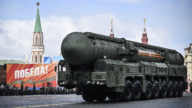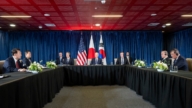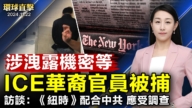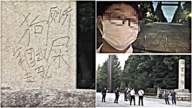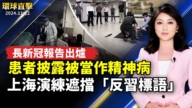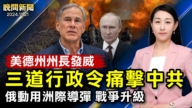【新唐人2014年11月08日讯】亚太经合组织(APEC)部长会议7号登场。中共方面力促APEC能对亚太自贸区(FTAAP)发出有力信号,不过,美方则坚持亚太自贸区(FTAAP是长期目标。而美方召集的跨太平洋伙伴关系协定(TPP)部长会议,也将在8号登场。双方叫阵意味浓厚。到底这次在北京举行的2014APEC会议,能“开”出什么样的成果呢?我们一起来看看下面的报导。
为期2天的APEC资深官员会议6号闭幕,由于分歧意见较大,历经延会5个多小时的马拉松式协商才结束。
据台湾《中时电子报》报导,尽管APEC成员国对中国积极推动的FTAAP路线图,列入部长联合声明,以及领袖峰会的《北京宣言》已有共识,但由于中美俄日对FTAAP不同调,因此还没有明确时间表。
在APEC部长会议登场前夕,中共商务部长高虎城接受中共官媒采访,再度呼吁APEC成员,进一步推进区域经济一体化。
美国白宫副国家安全顾问艾金森(Caroline Atkinson),6号在华府的一场研讨会上则表示,北京在APEC提出的FTAAP,是一个长期目标。
美国中文杂志《中国事务》总编辑伍凡表示,FTAAP历时8年仍未成功,其中有一个很大的症结。
美国中文杂志《中国事务》总编辑伍凡:“中国在2001年参加了WTO之后,到现在已经14年了,在整个过程中间,中共政权对WTO,是对我有好处的我统统拿,对我不利的呢,统统拒绝。它这一贯作风搞了十几年了,并且控制人民币,又是大量的毒品输出,所以搞得美国和其他国家觉得跟中国做生意不可靠,没有信誉。”
此外,伍凡还提到,WTO规定中国要开放包括金融、电讯、文化电影产品等市场,但中共统统不开放。由于WTO的功能没有充分发挥,所以想要建立一个广泛的亚太自由贸易区。
由美国主导的TPP,从2002年开始酝酿,旨在促进亚太区的贸易自由化。
目前,包括美日澳等在内的12个APEC成员国,正在就TPP进行讨论,但美国与日本之间的市场准入意见分歧,成为TPP的一大阻力。
TPP被外界视为美国重返亚洲战略的一个经济核心部分。由于它没有把中国涵盖入内,因此一些评论人士认为,这是美日联手遏制中国经济崛起的一个手段。
伍凡:“TPP为什么不要中国呢?它是针对中国(共)的这种对贸易的不诚实、不遵守规矩,一直用国营企业做生意,所以把它排除在外,根本原因在这里。”
不过,也有学者表达了不同看法。
台湾国立政治大学国际关系研究中心主任严震生:“它不是排斥中国。事实上日本都有问题啊,日本自己保护农业成这个样子,所以日本不一定能够加入的。今天TPP就是一个要完全开放的。如果要走自由经济开放的话,市场经济,那就一步到位,TPP其实规格比较高,是最好的。 ”
对北京而言,FTAAP是与现在的贸易伙伴达成最惠待遇的平台。如果TPP通过,参与的12个国家之间的贸易将会增加。据美国智库彼得森国际经济研究所(Peterson Institute for International Economics)估计,这可能会造成中国每年损失约1000亿美元的出口额。
日本共同社此前报导,美方已计划在8号APEC部长会议期间,召集TPP部长会议,力促TPP尽快达成协议。同一天,中方也主导召开APEC东道主伙伴对话会议。双方颇有大唱对台之势。
那么,这次北京举行的2014APEC会议,能开出什么成果吗?
伍凡:“中国想什么呢?通过亚太自由贸易区来掌握更多的市场,环太平洋区以及东南亚,正因为这样,所以东南亚国家他们(也)有自己的算盘。我看APEC会议不会有什么结果。”
不过,伍凡表示,因为还有其他方面的协定没有达成,所以APEC会议每年还要开。
采访/易如 编辑/王子琦 后制/周天
Sino-America Confrontation At APEC
The 2014 APEC Ministerial meeting took place
in Beijing on Friday.
The Communist China urged APEC to send a strong signal
to initiate the Free Trade Area of the Asia-Pacific (FTAAP),
while the United States insisted FTAAP is a long-term vision.
The US promoted Trans-Pacific Partnership Agreement
(TPP) countries will also meet this Saturday.
The confrontation seems intense.
What should we expect out of the 2014 Beijing APEC?
The 2014 APEC Senior Officials' Meeting just concluded
on Nov. 6 after more than five hours of marathon
negotiations among participants.
China Times reported that although a road map of the
process of launching the FTAAP has been included in the joint
ministerial statement as well as the Beijing Declaration,
there's no target date to finish the deal due to the different
tones of the world leaders.
Gao Hucheng, the Minister of Commerce Ministry
told Communist media that the APEC countries
are urged to promote regional economic integration.
In a recent forum in Washington, Caroline Atkinson
has described the FTAAP as a long-term vision.
China affairs magazine editor-in-chief Chris Wu explains
the main issue of not realizing FTAAP for the past eight years.
Chris Wu: “China has joined the WTO in 2001.
For the past 14 years, the regime's attitude has been
one of taking benefits but rejecting those that are
unfavorable to the regime.
For more than 10 years, it has controlled the RMB
and exported toxic foods.
The international community feel the regime
is unreliable and untrustworthy."
Chris Wu mentions China has failed to open up finance
markets, telecommunications and entertainment
as inquired by WTO China.
The lack of WTO function has promoted the idea
of a regional free trade agreement in the Pacific.
The idea of TPP agreement was negotiated in 2002 aimed
at promoting free trade in Asia Pacific.
“The TPP countries have struggled to strike a deal
due partly to Japan-U.S. bickering over market access
for agricultural products and autos,”
reported Kyodo News International.
TPP is generally regarded as the core US economic strategy
to return to Asia.
Exclusion of China in the TPP is believed to be a joint effort
of the U.S. and Japan to curb China's economic threat.
Chris Wu: “Why is China excluded from TPP?
The main reason is the lack of honesty and rule
in the Chinese trade,
in particular the existence of the state-owned enterprises."
However, there are different views.
Director of the Institute of International Relations
of National Chengchi University, Taiwan, Chen-shen Yen:
“China was not particularly excluded.
In fact, even Japan has problems too.
Japan has protected its agriculture to a point
that it might not join the TPP.
The TPP is aiming at openness.
Free economy requires the market to be open.
The standard of TPP is relatively higher and the best."
“For Beijing, the FTAAP would offer a way to ensure that
it continues to get preferential access to some of its largest
trading partners.
A TPP deal would cost China about $100 billion a year in lost
exports as the partners trade more among themselves and less
with China, according to an estimate by the Peterson Institute
for International Economics, in Washington,” reported WSJ.
Kyodo news reported TPP trade ministers will meet
in Beijing on Saturday on the sidelines of APEC.
So, what is expected out of the 2014 Beijing APEC?
Chris Wu: “To China, it is to master the market
through FTAAP.
But the countries in the Pacific-Asia
also have their own ideas.
I don't think there'll be anything concrete out of the APEC."
Chris Wu explains that many other unsettled issues
warrant the upcoming annual APEC.
Interview/YiRu Edit/ WangZiQiPost-Production/ZhouTian



